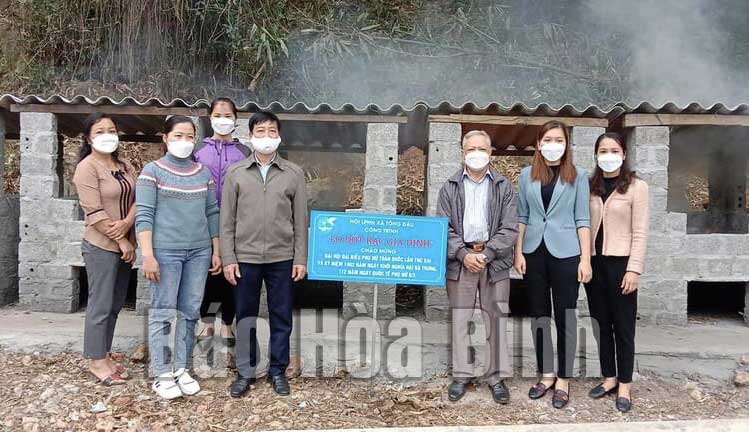
(HBO) - Currently, Mai Chau district of Hoa Binh province has been collecting domestic waste in Mai Chau township and five tourist sites in Chieng Chau, Tong Dau, Dong Tan, and Van Mai communes to the district's centralised waste landfill for treatment. The rate of collected waste surpasses 90 percent and that of waste treated reaches 80 percent.

The model of
"family incinerator" in Cha hamlet, Tong Dau commune (Mai Chau)
proves effective in keeping the environment green, clean and beautiful.
To carry out tasks and measures to strengthen waste management
in the locality, the district has issued many documents and plans to assign
specific missions and responsibilities to divisions, boards, communes and
townships to improve the efficiency of daily solid waste collection and
treatment. The collection, transportation and treatment of domestic waste is
assigned to the agricultural, sanitation and environmental cooperative - Mai
Chau branch. On average, the amount of waste collected is more than 12 tonnes a
day, of which nearly 10 tonnes is treated.
Kha Van Thanh, head of the district Division of Natural
Resources and Environment, said that to increase the rate of domestic waste
collection and treatment, the district People's Committee has stepped up
dissemination of the Law on Environmental Protection and its guiding documents
to officials and locals, implemented the socialisation of environmental
protection, and initially formed some
self-governed environmental models carried out by mass organisations.
In addition, the district has directed relevant agencies to
guide people to classify waste at source, built portable waste tanks to
classify and treat organic waste at households.
In the coming time, the district will continue to improve
dissemination and education work to create a change in awareness and action of
people from all walks of life on the responsibility for environmental
protection and waste classification at source, limiting the use of plastic bags
and single-use plastic products, and dumping garbage on time and in the right
place; and promote the formation of self-govered groups./.
The emulation movement "Hoa Binh joining hands to build new-style rural areas” has been widely spreading, becoming a driving force that motivates the localities to renew rural landscapes and improve the material and spiritual lives of the residents. In this movement, the people play a central role-both as the main implementers and direct beneficiaries of its outcomes.
In response to the global digital revolution, Hoa Binh Newspaper is transforming itself into a modern and multi-platform media hub, blending cutting-edge technology with a restructured newsroom and a new generation of tech-savvy journalists.
Hoa Binh province’s Association of the Elderly recently held a conference to review the project on expanding the inter-generation self-help club model until 2025.
In a move to implement Resolution No. 57-NQ/TW, issued on December 22, 2024 by the Politburo, which targets breakthroughs in science-technology development, innovation, and digital transformation, the Hoa Binh provincial Department of Health has issued a plan to roll out the "Digital Literacy for All” campaign within the local health sector.
An Nghia Commune (Lạc Sơn District) is one of the communes that achieved the tha standard of the national new rural area in 2018. Entering a new development phase, the commune is now trying to meet the criteria for the advanced new rural development. With the strong political will and the public consensus, the commune is gradually overcoming the challenges to reach this goal, aiming for the sustainable development.



